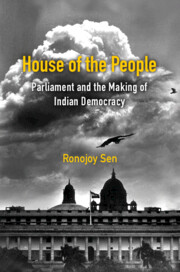Book contents
- Frontmatter
- Dedication
- Contents
- List of Illustrations
- Acknowledgements
- Introduction
- 1 The Road to Parliamentary Democracy: The Constituent Assembly and Its Prehistory
- 2 Protean Institution: The Changing Composition of Parliament
- 3 ‘Please Take Your Seat!’ Disruptions in Parliament
- 4 Inside Out: The Parliamentary Committee System
- 5 Corruption, Criminality and Immunity
- Conclusion
- Index
5 - Corruption, Criminality and Immunity
Published online by Cambridge University Press: 11 October 2022
- Frontmatter
- Dedication
- Contents
- List of Illustrations
- Acknowledgements
- Introduction
- 1 The Road to Parliamentary Democracy: The Constituent Assembly and Its Prehistory
- 2 Protean Institution: The Changing Composition of Parliament
- 3 ‘Please Take Your Seat!’ Disruptions in Parliament
- 4 Inside Out: The Parliamentary Committee System
- 5 Corruption, Criminality and Immunity
- Conclusion
- Index
Summary
Beehad mein toh baaghi hotey hain, dacait miltein hain Parliament mein. (In the ravines you get rebels, dacoits you encounter in Parliament.)
– Paan Singh TomarCollection of party funds, especially for elections, is perhaps the largest source of political and other fields of corruption.
– Jayaprakash NarayanThe link between parliamentary representatives and corruption has drawn increasing scrutiny due to a series of offences by lawmakers in recent years as well as the high number of members of parliament (MPs) with criminal charges against their name. Indeed, as many as 43 per cent of MPs in the seventeenth Lok Sabha had pending criminal cases against their name. While the number of MPs facing criminal charges is available only from 2004, due to a Supreme Court ruling, the reputation of elected representatives and politicians in general has been in decline for the past several years. In public perception, there is a strong link between corruption and the political class. According to a Pew survey, conducted before the 2019 Indian general election, two-thirds of the respondents said most politicians are corrupt. The same survey revealed that 66 per cent of the people believed that corrupt officials were the biggest problems in India, next only to unemployment and rising prices. Not surprisingly, in 2020 India ranked 86 out of 180 countries in Transparency International's Corruption Perception Index.
Corruption has ancient roots in India. Kautiliya in his Arthashastra, written in the fourth century BCE, said, ‘Just as it is impossible to taste the honey (or the poison) that finds itself at the tip of the tongue, so is it impossible for a government servant not to eat up, at least, a bit of the king's revenue.’ It was perhaps from the 1970s that corruption and the political class became inextricably linked. It got further entrenched under Rajiv Gandhi, who was prime minister from 1984 to 1989. Although Rajiv was initially dubbed ‘Mr Clean’, his tenure saw several scandals being unearthed, including the one around the Bofors defence deal, which led to serious disruptions in parliament and arguably to Rajiv being voted out. Indeed, the ‘corrupt’ politician became a part of public discourse and a stock figure in several Bollywood films from the 1980s.
- Type
- Chapter
- Information
- House of the PeopleParliament and the Making of Indian Democracy, pp. 215 - 275Publisher: Cambridge University PressPrint publication year: 2023



